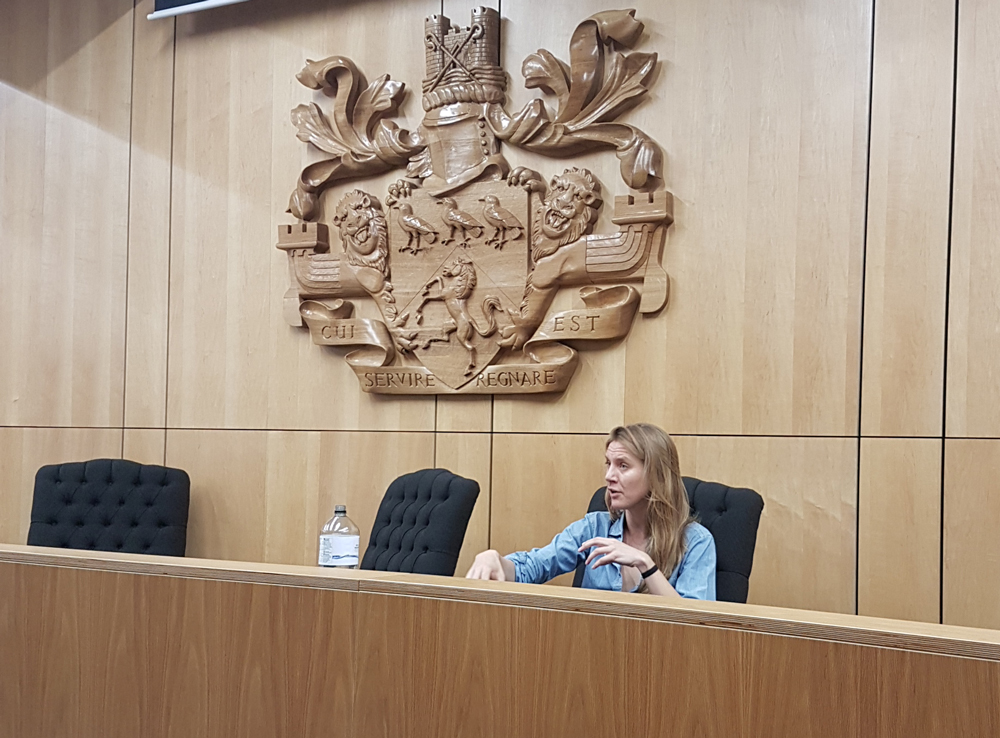A report by Eric Loefflad on a talk by Dr Isobel Roele of Queen Mary University London for the Kent Centre for Critical International Law (CeCIL)
The CeCIL lecture series continued in October 2017 with riveting observations by Dr Isobel Roele (Queen Mary, University of London) in a lecture entitled ‘Articulated Security: The Rise (and Fall) of the Machine.’
In this talk, which drew on work for a larger book project, Isobel provided a perceptive analysis of the security practices within the United Nations system drawing upon Michel Foucault’s concept of ‘disciplinary power’ as something in between direct commands via ‘sovereign power’ and self-imposed regimes of conduct via ‘governmentality/biopolitics.’ In applying this approach to the UN system, it was noted that approaches to security changed significantly from the institution’s inception, in that rather than being the specialty of the great powers that dominated Security Council, responsibility for determining security threats has been diffused throughout the entire structure of the UN. Here much of the discourse has been on linking issues, such as crime, pandemics, terrorism financing, and weapons of mass destruction, that were once separately treated, are increasingly being integrated in ways that produce entirely new arrangements that span a number of UN organs and their affiliates.
In the process of building these new machine-like structures of inter-linked networks and individuals to confront multiple issues, numerous implications for law and legal systems are raised. In this capacity, Isobel turns our attention to efforts surrounding criminal justice where responses have to consider diverging procedural and evidentiary standards in varied jurisdictions where transnational crimes are planned and executed. Moreover, this process of linking together institutional forces has often benefited from a non-traditional understanding of legality where law functions not so much as a command of ‘what to do’ but rather guidelines for ‘how to do.’ This notion of ‘cuddly law’ that seeks to shape behaviour, but lacks strong enforcement standards, nonetheless proves powerful in building structures through schemes of trainings, internships, and mentorship that create actual human relations across a variety of contexts thus sustaining the machine at the level of individual agency.
While, Isobel’s analysis certainly owes much to Foucault’s theories, it also exposes their limitations. For example, while Foucault’s articulations of disciplinary power were often centred on military metaphors, a key feature of militaries is that they have commanders and the administrative machine structures Isobel describes derive their power from the fact that no single individual is in charge. After all, these configurations of governance are perpetually being unmade and remade without any identifiable directing force in the proverbial ‘driver’s seat.’ Additionally, a limitation of Foucault is the fact he was bored by institutional power and as a result provides minimal guidance for how to think about the ways the UN machine-like governance structures are themselves institutionalised. Here Isobel directs our attention to Deleuze and Guattari and their concept of machinic assemblages premised on machines joining with other machines in a perpetually shifting manner. While such a conception of how security is articulated defies any easy resolution almost by design, Isobel certainly presents a nuanced alternative way to think about such structures in a world that increasingly defies long-established categories of power and control.

